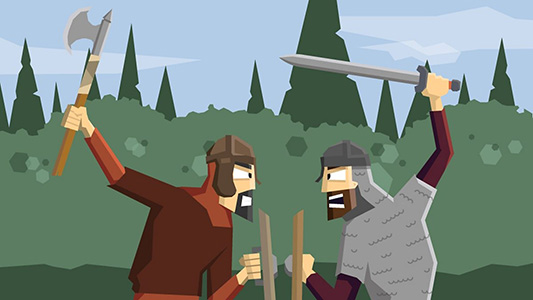It’s very common for people to think the world is getting more violent. See some online examples here. Nothing could be more wrong:
- The best talk about this Pinker’s: violence has been steadily decreasing for the last few hundred years
- Surges like the the USA 60s crime rate increase were reversed — and in any case this surge was a minor bump in a steep downtrend.
- Consider the extreme of our neolithic hunter-gatherer ancestors. Surely they weren’t more peaceful than we are now, so violence must have decreased by several orders of magnitude over the last 10,000 years — even if the last few decades have seen a sharp rise, “what with kids these days with their crazy ipods” — this increase is negligible on the larger scale.
- More and more people are dying of heart disease, cancer and similar diseases. For much of human history a violent death was one of the most common causes of death. Today the chances of dying this “unnatural” death in the USA are about 0.7%
- Contrary to popular belief, WW2 was not history’s bloodiest war, by percentage of population killed. Although it’s hard to figure out the bloodiest historical conflicts exactly, they were almost certainly wars in Central Asia/China, which truly were unparalleled in the degree of wholesale slaughter.
Pinker has great reasons for the decline of violence, but I want to list possible reasons for the perception that violence is increasing:
- It seems a general feature of human brain to easily believe things are trending downward. Some “old school” historians (Gibbon too I think) genuinely believed the Byzantine empire was the Roman empire in decline (see this, noting the earliest dates). If that’s true, the Byzantine empire declined for almost 1000 years, whilst producing some of the greatest works of art and scholarship!
- People have a cognitive bias of an idyllic childhood (unless you grew in in crap circumstances) — when you were a kid you were deliberately sheltered from negativity. Chances are the number of war victims from the first 3 years of your life is several times greater than in the last 3 years.
- A change in reporting style, which shoves mor in your face over time. Sobering: compare this to this (from page 35!).
- The 20th century is peppered with memorable surges of violence. Because the spike happens all at once, it makes more of an impression on the mind compared to prior centuries (where a slow, steady but ultimately higher death toll was common).
- It’s harder to empathise with times past: we can put ourselves in the shoes of most people killed in the 20th century, even from cultures very different to our own. Not so easy for the tens of millions killed, say, by the Mongols.
- As population increases (from peace! for without it advances in medicine, food, hygiene would be useless), the absolute number of people killed may increase. Even though your chances of dying “by the sword” may be falling dramatically, there may still be an increase in the absolute number of people killed.
Usual disclaimers about this not meaning there aren’t terrible things happening now, that we need to do stuff about it, etc. But interesting to see this perception as an inherent part of human nature.





0 Comments